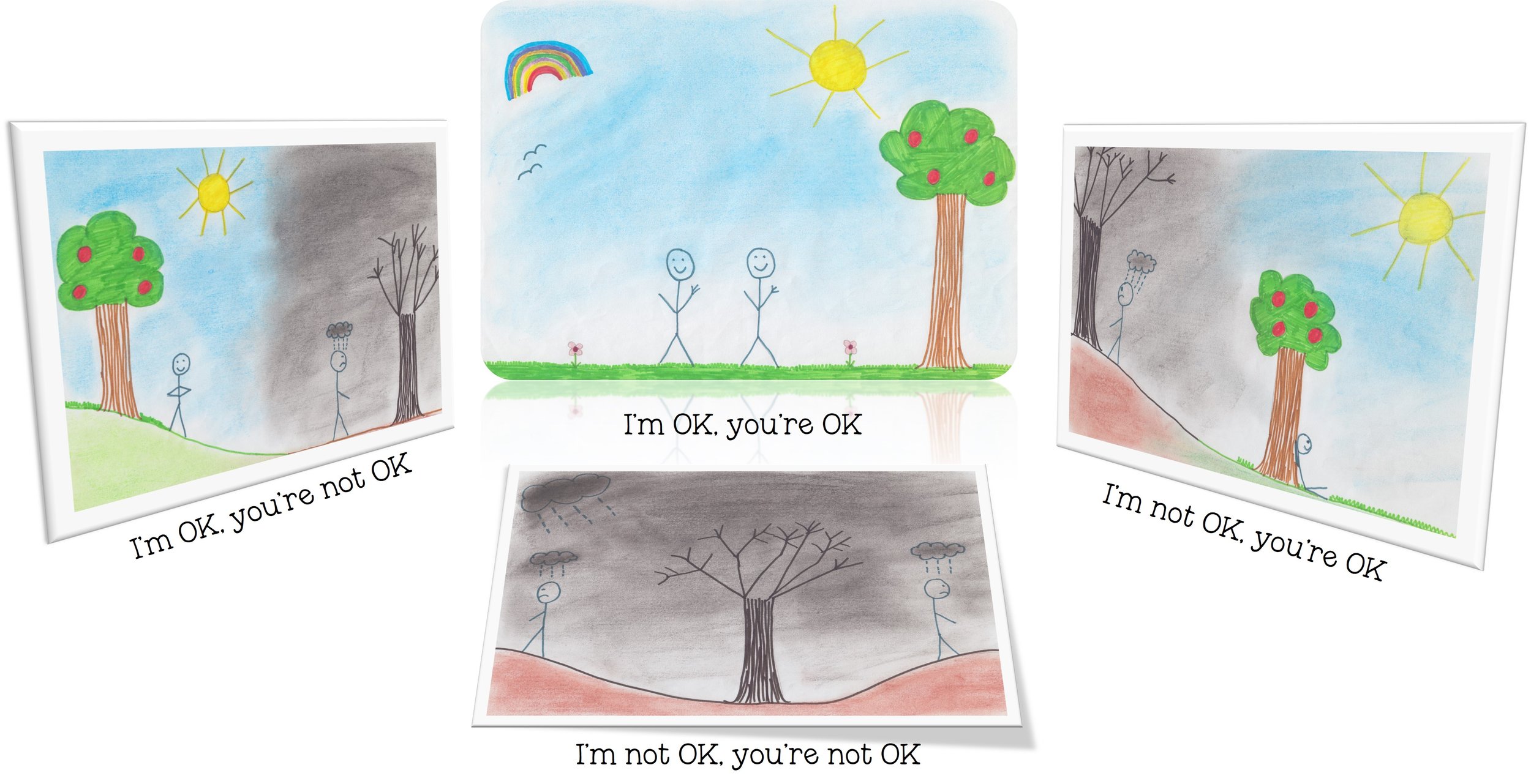
We can use this framework to improve our mental health
‘I’m OK, you’re OK’ is the position of optimal psychological health. However, none of us see the world from this perspective all the time. In order to maximise the time we spend in an ‘I’m OK, you’re OK’ position, it’s important to understand what supports us to feel ‘OK’ and what causes us to feel ‘not OK’.
When we experience feelings like stress, tiredness, worry etc, it’s more likely that we’ll feel ‘not OK’. When we feel ‘not OK’ our resilience is lower. If this persists over time and there’s an enduring sense of feeling ‘not OK’, we’re more likely to have difficult mental health experiences such as anxiety and depression.
Understanding ourselves is key to better mental health
The changes we experience can be difficult to notice, because we're immersed in our experience and the continuity it provides. However, when we move between perspectives, we might notice that we’re somewhat different. We might experience ourselves declining in some way - feeling increasingly anxious or self-critical, less motivated to engage with activities we usually enjoy, worrying more about the future, feeling helpless, withdrawing from family and friends. Any of these thoughts, feelings and behaviours are signals suggesting that we’re feeling 'not OK' and could be seeing the world from a 'not OK' perspective.
‘I’m OK, you’re OK’ - the position of optimal psychological health
Some factors causing us to feel ‘OK’ and ‘not OK’
-
Our thoughts, feelings and behaviour are rather like the weather in that they change how the world looks. They lend a backdrop to the day, setting the tone and shaping how we see the world around us. Just as dark clouds gathering overhead often lead to rain and stormy weather, so difficult thoughts can lead to us feeling 'not OK' and behaving in ways which are 'not OK'.
-
Our sense of being 'OK', or 'not OK' is influenced by the situations we find ourselves in. We pick up on features of present-day situations which echo previous experiences. In this way, we unknowingly replicate our early experiences of feeling 'OK' and 'not OK' and we can suddenly find ourselves feeling 'not OK' in present-day situations, for no apparent reason.
-
Our resilience - our ability to adapt, to deal with change and difficult circumstances and to recover - is influenced by the situation we find ourselves in, our overall levels of stress and how vulnerable we feel. As such, our resilience has a huge impact on whether we feel 'OK', or 'not OK' and the perspective we’re looking at the world from.
-
Our ability to influence, or change our circumstances - our power - has a huge impact on whether we feel ‘OK’, or ‘not OK’. When we’re able to meet our needs and change our circumstances, we’re far more likely to feel 'OK'. Conversely, being unable to meet our needs, or influence the world around us - being powerless - can easily cause us to feel 'not OK'.
-
We can move between feeling ‘OK’ and ‘not OK’ because of our interactions with others, for a variety of reasons. Some of these factors include whether we feel safe or unsafe, our early experiences, our status within a group, difficult interactions and projection.
-
We notice things that match our expectations and previous experiences of how the world works. Without awareness, we filter what we take-in to fit our stories, our beliefs and our expectations around being ‘OK’ and ‘not OK’.
-
Our physical health can have a massive impact on the way we exist in the world - whether we feel 'OK' or 'not OK' and consequently on our mental health. This is particularly so when we’re faced with a sudden decline in health, such as chronic or life threatening conditions, and we can easily begin to feel 'not OK'.
-
Our level of knowledge, experience and competence can also influence whether we feel ‘OK’, or ‘not OK’. The more we know about something and the more experience we have, the more competent we become and the better we're likely to feel about doing it. When we're having new experiences, like learning new skills, this can really be noticeable.
-
The words we use, their connotations and the way in which we use them, all have an impact on whether we feel ‘OK’, or ‘not OK’. For example, if we say we’re 'struggling' with something, it sounds like we're having a difficult time. If, however, we say we’re being 'challenged' with the same thing, the connotations are slightly different.
By becoming more aware of the factors which support us to feel ‘OK’ and cause us to feel ‘not OK’, we can develop greater kindness and compassion for ourselves and, through this, enjoy better mental health. You can learn more about this at a workshop.
Find ways to do things differently






